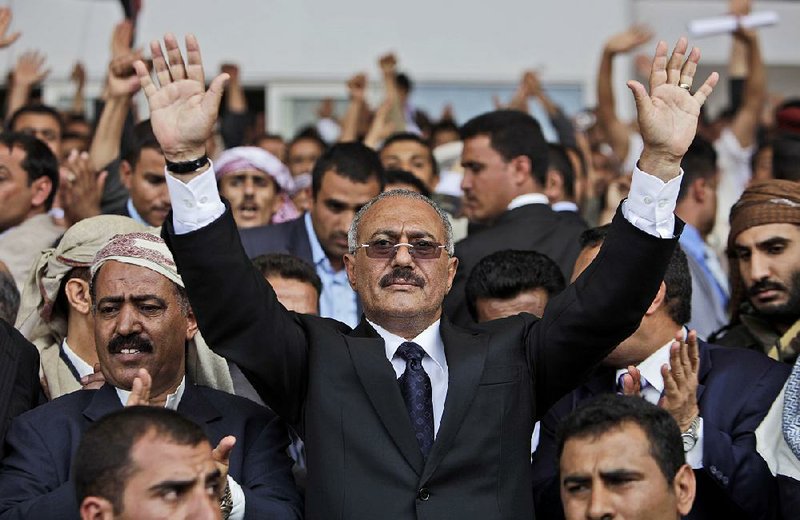SANAA, Yemen -- Ali Abdullah Saleh, the deposed president of Yemen who ruled for more than three decades, has died in the latest outbreak of violence in the country's civil war, members of Saleh's political party said Monday.
Saleh's death was also announced by the Yemeni rebel group that gained strength after he was pushed from power in 2011 and that later made an alliance with Saleh and forces loyal to him.
The exact circumstances of his death could not be immediately confirmed.
Images circulating on social media showed Saleh's body cradled in a floral blanket, surrounded by fighters, with what appeared to be a large head wound. Initial reports indicated he was killed by the rebel group, known as the Houthis -- a startling turn, given that Saleh had been allied with the Houthis until sometime last week.
Saleh's apparently violent end removed one of the Arab world's most resilient and ruthless strongmen, a onetime U.S. ally who was toppled six years ago during the Arab Spring protests that swept the region but who managed to retain his influence. His death left Yemen -- chronically impoverished, riven by violence and in the throes of a civil war -- facing even greater uncertainty.
The war began in 2015 and has killed more than 10,000 people while drawing in a Saudi-led military coalition, backed by the United States. The United Nations and aid groups have called for international efforts to ease one of the world's most dire humanitarian crises.
German Foreign Minister Sigmar Gabriel said the situation in Yemen is "probably the worst humanitarian catastrophe right now worldwide."
How to enable access to humanitarian aid to people caught in the war, which is supported on one side by Saudi Arabia and by Iran on the other, is a topic the European Union and the U.S. must try to resolve, he said after a Monday meeting in Paris with his French counterpart.
The Houthis and the Saleh forces -- bitter foes for years -- had struck an alliance of convenience in the latest conflict. The march across Yemen by their combined forces stunned the country's neighbors, including Saudi Arabia, which viewed the Houthis as a proxy force for Iran, Saudi Arabia's regional enemy.
Saleh's death came as the battle took another confounding turn. His party's alliance with the Houthis disintegrated, and the two sides fought bloody clashes in Sanaa, the capital. The fighting killed more than 125 people, according to the International Committee of the Red Cross, and raised fears of a deadly new chapter in the war.
Residents of the capital said that, hours after the announcement of Saleh's death, the fighting had subsided.
Witnesses said they saw fighters surrender and others withdraw from their positions. The Al-Masirah TV network, run by the Houthis, also showed footage of what appeared to be Saleh's forces surrendering. It was not immediately clear whether the fighting would resume again in the morning.
On Saturday, Saleh extended a hand to the Saudi coalition in a speech, calling on it to stop its bombing campaign and start "a new page."
In a televised speech Monday after Saleh's death, the Houthi leader, Abdul-Malek al-Houthi, said the group had defeated a "large-scale conspiracy that posed a threat to the security and stability of the country, aimed at supporting the forces of aggression."
A Houthi spokesman, Abdel-Rahman al-Ahnomi, said rebel fighters killed Saleh as he tried to flee toward Saudi Arabia. The account could not be independently verified.
From exile, Yemen's internationally recognized president, Abed Rabbo Mansour Hadi, urged Yemenis to unite against the Houthis.
"Let's put our hands together to end this nightmare," said Hadi, who succeeded Saleh in 2012. He added that government forces would support an "uprising" against the Houthis in Sanaa.
Information for this article was contributed by Ali Al-Mujahed, Kareem Fahim and Brian Murphy of The Washington Post; and by staff members of The Associated Press.
A Section on 12/05/2017

